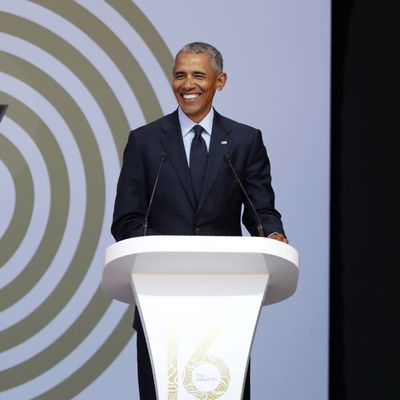
This week, Barack Obama delivered a long and thoughtful defense of liberalism, pluralism, and democracy against strongman populism. The themes, which in nearly all respects tracked the ideas he promoted throughout his presidency, came in pointed contrast to the contemporaneous spectacle of his successor’s embrace of his favorite strongman.
The former president’s defense of liberalism included a defense of universalism, in contrast to a tendency in left-wing thought to essentialize all thought by its level of privilege. “Democracy demands that we’re able also to get inside the reality of people who are different than us so we can understand their point of view … ” he argued. “And you can’t do it if you insist that those who aren’t like you — because they’re white, or because they’re male — that somehow there’s no way they can understand what I’m feeling, that somehow they lack standing to speak on certain matters.”
The way for conservatives to acknowledge the appeal of Obama’s speech was to insist it somehow contrasted with his behavior as president. “Of course … this is the president who made Al Sharpton his ’go-to man on race’ and who said Latinos needed to ’punish’ their ‘enemies,’” writes National Review’s Jim Geraghty. “It’s great that Obama realizes that identity politics can be corrosive to civil society and that they can Balkanize a once-thriving, relatively harmonious society. It just would have been good to hear this wisdom from a president instead of an ex-president.”
In fact, Obama said the same things many time during his presidency. (For examples, see here, here, here, and here.)
Geraghty’s examples hardly establish that Obama devoted his presidency to stoking hatred against white people. The Sharpton line links to a story depicting Obama’s administration using Sharpton as a mediator to stop violent protests in Ferguson. “Obama,” reports the story Geraghty links, “was ‘horrified’ by the images he was seeing on TV, Jarrett told Sharpton, and proceeded to pepper him with questions as she collected information for the president: How bad was the violence? Was it being fueled by outside groups — and could Sharpton do anything to talk them down?”
The line about punishing enemies was a banal 2010 expression of hope that Latino activists would stop taking out their frustration on Democrats and instead exact a political price on the party that opposed immigration reform: “If Latinos sit out the election instead of saying, ‘We’re gonna punish our enemies, and we’re gonna reward our friends who stand with us on issues that are important to us’ — if they don’t see that kind of upsurge in voting in this election — then I think it’s going to be harder. And that’s why I think it’s so important that people focus on voting on November 2nd.” After a predictable outcry, Obama quickly apologized and said he wish he had said “opponents.” In any event, he was not calling for bloodshed.
Obama, of course weaved universalist themes into his appeal from the very outset, beginning with his 2004 Democratic Convention keynote speech, through his address about race in 2008, to his 2015 speech commemorating the 50th anniversary of the March on Selma, which placed the civil-rights struggle at the heart of the American story. The whole idea that Obama was elected twice, and left office with a 60 percent approval rating, by attacking the racial group that accounts for 70 percent of the electorate is absurd on its face. What possible logic would there be for Obama to attack the constituency that supplied the majority of his votes in both 2008 and 2012?
Conservatives spent the Obama era whipping themselves into a racialized hysteria, imagining the consensus-minded moderate president was waging an attack on their way of life. Trump won the party’s nomination because, at some elemental level, he grasped the fact that the impulse driving Republican voters had nothing to do with small government or policy at all, but an amorphous cultural backlash propelled by a belief that minorities were taking over.
Conservative intellectuals spent this period either stoking the backlash or denying it. Their most basic technique consisted of ignoring the conciliatory universalism of both Obama’s message and his agenda, while concocting out of thin air an imaginary Obama as a race-baiting radical.
Geraghty has imbibed the right’s caricature deeply. He quotes Obama saying, “It’s not just money that a job provides; it provides dignity and structure and a sense of place and a sense of purpose.” He snarkily replies, “Amen, Mr. President! How long have conservatives made this argument in various welfare-to-work proposals?”
You know who else made this argument? Barack Obama!
Giving poor people money so they could sit around and never work was what Republicans said was Obama’s policy, but it wasn’t actually Obama’s policy. So successfully did they persuade themselves of their own propaganda that, when coming face-to-face with the actual Obama now, they cannot recognize him.






























